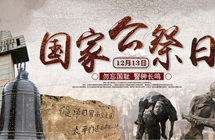美籍在华专家:逃离阴影 日本需就南京大屠杀真心致歉
|
英文《中国日报》12月13日刊登美籍记者兰迪•赖特(Randy Wright)撰写的文章《反思南京大屠杀:逃离阴影》,文中痛斥日本二战时在南京犯下的滔天暴行,呼吁日本向德国学习,承认错误向中国真心致歉。 以下为双语全文: It's with a somber heart that I find myself today contemplating the 80th anniversary of the infamous rape and slaughter of hundreds of thousands of innocent Chinese in Nanjing by invading Japanese troops in the winter of 1937-38.
That collective atrocity - made up of thousands of individual atrocities committed over several weeks - shows at a breathtaking scale the nature of the beast at the heart of the human race and the danger of unchaining it. The Nanjing Massacre is among the ugliest incidents in world history, though far from unique in its depravity. I never served in uniform (an unfortunate gap in my life's experience), nor in combat. Yet my years of reading military history have taught me something of the horrors of war, the greed of nations, of man's inhumanity to man, the fragility of peace and the value of life. And the cycle continues. In the ominous words of Plato: "Only the dead have seen the end of war." I wish it were not so. Across millennia, emperors and assorted tyrants have murdered for land, treasure, religion or political power, and spun the rhetoric of hate and blame to achieve their ambitions. The result, sooner or later, is always the same: a river of blood - often the most precious. It's easy enough to see this pattern. But it's even easier to look away. A searing event like Nanjing is uncomfortable. It's hard to absorb. It's scarring. But to avert the eyes is to relegate history to mere abstraction, to conveniently forget that the victims of atrocities were real people. Remembrance is the beginning of healing. In fact, the bitter dregs of truth have curative value for the soul - especially for past aggressors like the Japanese, who, in dehumanizing their victims, only dehumanized themselves. Some in Japan seem to have difficulty with deep reflection. They just want the war to go away, and have chosen a path on which the goal is to save as much face as possible. What Japan has styled as apology over the years has been half-hearted, not full-throated; and that, in turn has allowed bitterness to linger. Instead, it should follow the spirit of former German chancellor Willie Brandt, who knelt humbly in the rain in 1970 at the Warsaw Ghetto, acknowledging the evil Nazi Germany brought upon the Jews. It should adopt the posture of Angela Merkel, the current German chancellor, whose stance was unequivocal when Israel's leader tried to shift blame for the Holocaust to an Islamic cleric: "All Germans know the history of the murderous race mania of the Nazis that led to the break with civilization that was the Holocaust," Merkel's spokesman said. "This is taught in German schools for good reason. It must never be forgotten. ... We know that responsibility for this crime against humanity is German, and very much our own." Likewise, the massacre in Nanjing is very much Japan's own. Are these just empty words, bleached of meaning by the passage of time? I don't think so. Nor is a Japanese apology merely a question of making China feel better. Japan itself will never escape the shadow of its past until it can wash itself clean through honest, forthright acknowledgement of its sins. |









